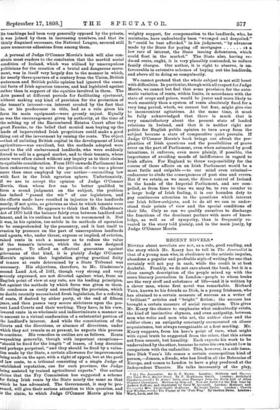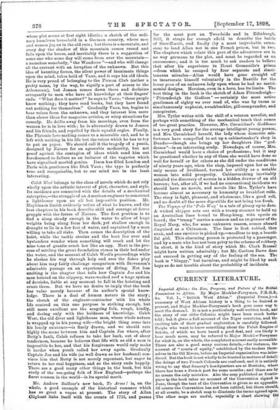RECENT NOVELS.*
NOVELS about novelists are not, as a rule, good reading, and the story which Mr. Keary has to tell in The Journalist is that of a young man who, in obedience to the artistic impulse, abandons a popular and profitable style of writing for one that certainly will not pay in cash, while the credit is at best doubtful. Frankly, we do not care about the book, but it is a close enough description of the people mixed up with the more literary journalism in London—people to whom books are the very stuff and substance of life—and it is written by a clever man, whose first novel was remarkable. Richard Vaux, known to his friends as Dick, is a young Irishman, who has attained to a certain measure of success as a writer of " brilliant " articles and " bright " fiction ; the success has brought a certain measure of social recognition. This gives Mr. Keary the chance to emphasise what undoubtedly exists, the kind of instinctive shyness, and even antipathy, between men who write and men who act, the author class and the soldier class ; an antipathy constantly surmounted on closer acquaintance, but always recognisable at a first meeting. Mr. Keary suggests, from his hero's point of view, what might with equal truth be suggested from the other, that this arises not from conceit, but humility. Each expects his work to be undervalued by the other, because berates his own talent low in comparison with the unfamiliar. This, however, is a side issue. Into Dick Vaux's life comes a certain cosmopolitan kind of person,—Jonsen, a Swede, who has lived in all the Bohemias of Europe, and comes to London to have a play produced at the Independent Theatre. He talks incessantly of the play, • (1.) The Journalist. By C. F. liesry. London Methuen and Co.— (2.) Caleb Ire.t, Master Diver. By F. Hopkinson Smith. London Archibald Constable.—(3.) To Arm,! being some Passages from the Early Life of Allan Oliphant Chirurgeon. Written by flim,elf. Now set forth for the first time by Andrew Hdfonr, and illustrated by Cecil W. Qoinnell. London: Methuen and Co —(4.) Mrs. Carmichael's Goddesses. By Sarah Tytler. London, Chatto and Windns.—(5.) The Voyage of the 'Palo Way.' By Carlton Dawe. Lando' s, Ward, Look, and Co.
whose plot seems at first sight idiotic; a sketch of the ordi- nary humdrum household in a German country, where men and women jog on in the old ruts ; but there is a mountain, and every day the shadow of this mountain comes round and falls upon the house, and inevitably there is a suggestion of some one who some day will come from over the mountain- s nameless somebody, "the Wanderer "—and who will change all the current with an irruption of the unknown. But this idea of haunting forces, the silent power of inanimate things upon the mind, takes hold of Vaux, and it saps his old ideals. He is very proud of belonging to the Pira3an Club (rather a pretty name, by the way, to signify a port of access to the Atheneum), but Jonsen comes down there and declaims arrogantly to men who have all knowledge at their fingers' ends. "What does it matter?" he says to Vaux; "these people know nothing; they have read books, but they have found out nothing for themselves." Gradually Vaux, too, begins to hear voices from the unknown, and they interest him more than clever ideas for magazine articles, or witty situations for comedy. He drifts away from his moorings, even from the woman he is in love with ; he is alternately drawn to Jonsen and his friends, and repelled by their squalid orgies. Finally, the Platonic love-making comes to a miserable end, and he is left with nothing in his life but the voices which he has to try to put on paper. We should call it the tragedy of a youth, designed by Nature for an agreeable mediocrity, but not proof against the contagion of ideas which send him out foredoomed to failure as an imitator of the vagaries which have signalised morbid genius. Ibsen has filled London and Paris with gentlemen like Dick Vaux ; the type is perfectly true and recognisable, but to our mind not in the least interesting.
Caleb West belongs to the class of novels which do not rely wholly upon the artistic interest of plot, character, and style. Its incidents are connected with the details of a mechanical anterprise,—the struggle of an American engineer to construct a. lighthouse upon an all but impossible position. Mr. Hopkinson Smith evidently writes of what he knows, and the best chapters in his book describe skill and courage at fierce grapple with the forces of Nature. The first problem is to find a sloop steady enough in the water to allow of huge weights being slung from her deck, yet shallow enough in draught to lie in a few feet of water, and captained by a man willing to take all risks. Then comes the description of the hoist, while the tackle strains and the boat lies over and bystanders wonder when something will crack and let the nine tons of granite crush her like an egg. Next is the pro- cess of settling the great foundation stones in their bed under the water, and the account of Caleb West's proceedings while he slashes his way through kelp and sees the fishes play about him may fairly challenge comparison with Stevenson's admirable passage on an experience of diving. Not less exciting is the chapter that tells how Captain Joe and his men hoisted on the slippery, wave-washed reef a huge system of derricks, liable at any moment to fall in the hoisting and crush them. But we have no desire to imply that the book has value merely because of its author's special know- ledge. There is a deal of human nature in the story; the sketch of the engineer-contractor with his whole life centred on this one purpose is striking enough, but still more excellent are the seagoing folk, rough, kindly, and daring only with the boldness of knowledge. Caleb West, the old diver and lighthouse man, whose whole nature is wrapped up in his young wife—the bright thing come into his lonely existence—is finely drawn, and we should rate highly the scene between him and Captain Joe where, after Betty's fault, Caleb refuses to take her back, out of sheer tenderness, because he believes that life with so old a man is impossible to her, and that his forgiveness would only make it harder when youth called her away again. Gradually Captain Joe and his wife (as well drawn as her husband) con- vince him that Betty is not merely repentant, but eager to return to her real happiness, and so the story ends happily. There are a good many other things in the book, but this study of the Rea-going folk of New England—perhaps the finest seamen in the world—is its special merit.
Mr. Andrew Balfour's new book, To Arms ! is, on the whole, a good example of the historical romance which has so great a vogue at present. The story of Allan Oliphant links itself with the events of 1715, and passes for the most part on Tweedside and in Edinburgh. Still, it strays far enough afield to describe the battle of Sheriffatuir, and finally (by a most improbable exten- sion) to laud Allan not in one French prison, but in two. The chapters which relate this part of the adventures are in no way germane to the plot, and must be regarded as an excrescence ; and it is too much to ask readers to believe that after his experience in Henri Grenouille'e prison —from which he escaped by four separate and simul- taneous miracles—Allan would have gone straight off to incarcerate himself voluntarily in the Bastille for the beaux yeas of an unknown lady upon whom he had no matri- monial designs. Heroism, even in a hero, has its limits. The best thing in the book is the sketch of Adam Pittendreigh- " Pittendreigh the Godless" — certainly the most active gentleman of eighty we ever read of, who was by turns or simultaneously euphuist, swashbuckler, pill-componnder, and conspirator.
Mrs. Tytler writes with the skill of a veteran novelist, and perhaps with something of the mechanical touch that comes of too great practice. However, Mrs. Carmichael's Goddesses is a very good story for the average intelligent young person, and Mrs. Carmichael herself, the lady whom domestic mis- fortunes have compelled to set up a cabinetmaker's shop in Dundee—though she brings up her daughters like "god- desses "—is an interesting study. Nowadays, of course, Mrs. Carmichael would have a choice of professions ; but it may be questioned whether in any of them she would have done so well for herself or for others as she did under the conditions of ninety years ago, when the shop, imposed upon her as the only means of livelihood, turned her ability as a notable woman into solid prosperity. Cabinetmaking inevitably entailed the discovery of secrets in a hidden drawer of an old bureau; bat, after all, if we had no conventional incidents we should have no novels, and novels like Mrs. /2ytler's have become almost as necessary to humanity as breakfast rolls. The story is light, pleasant, and wholesome, like a good roll, and no doubt all the more digestible for not being too fresh.
The Voyage of the Palo Way' is a tale of piracy up to date. A wicked skipper sets out with a tramp steamer to hold up an Australian liner bound to Hong-kong, with specie on board ; the "tramp" carries a cannon and an ex-gunner of the Royal Navy, who, for some unknown reason, comes aboard disguised as a Chinaman. The liner is first robbed, then sunk, and one survivor is picked up,—needless to say, a beauti- ful girl. This charming person is protected by a passenger, and by a mate who has not been privy to the scheme of robbery. In short, it is the kind of story which Mr. Clark Russell might have written admirably ; but Mr. Carlton Dawe does not succeed in getting any of the feeling of the sea. The book is " bluggy," bat harmless, and might be liked by such boys as do not trouble about the probability of incidents.



































 Previous page
Previous page